Showing 1-20 of 27 results

Business Tools for Ag Video Series
This seven-part video series was produced by Utah's Master Stockman Consulting to teach new and beginning producers about valuable tools for making economically sustainable decisions. This includes discussion of basic economic principles and tools, as well as how to conduct on-farm research and apply existing research to your operation. Basic Farm and Ranch Economics This […]
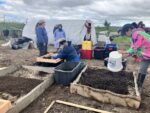
Training Ag Leaders in the Bering Strait
A large nonprofit with a long history in Alaska, the Rural Alaska Community Action Program (CAP) is well-known for its work addressing housing, workforce development, and health challenges. When COVID hit, the organization added food security work to their priorities. With the Coronavirus Aid, Relief, and Economic Security (CARES) Act funding, they initiated ten food […]

How to Get Your Message Out
This Online Communication Roadmap for Rangeland Professionals by the University of Arizona will help improve your skills and knowledge of online communication by outlining key strategies for communicating your rangeland or natural resources work to the right audiences. The authors suggestion you consider this the communication roadmap for when you want people to read a […]
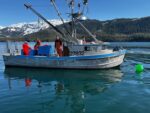
Can Kelp be Alaska’s New Agricultural Frontier?
Alaska is relatively new to the business of farming kelp, a type of seaweed gaining popularity across the globe because it’s healthy for humans and good for the planet, too. Kelp is rich in vitamins, minerals and protein, requires no soil or fertilizers to grow, provides habitat for fish, and balances ocean acidification caused by […]
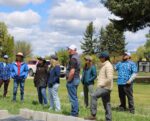
Exploring Montana Agriculture
The SARE Fellows trip to Montana was amazing. I enjoyed seeing the collaborative efforts among the various farms and organizations to share their knowledge, expertise, and resources to help each other thrive while meeting the needs of the community. This experience has shown me how people working together is what truly makes programs sustainable. – […]
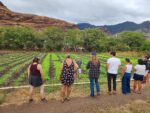
Building Bridges Across the Pacific
Collaboration, education, and community empowerment hold potential for driving positive change. Accordingly, Regional Food Business Centers in Hawaiian, Pacific Island, and Alaskan communities are harnessing their skills and resources to reach their shared vision of resilient, sustainable, and self-reliant local food systems. Geographic isolation, food transit logistics, large Indigenous populations, underdeveloped infrastructure, extreme climate change […]
Farming and Food Narrative Project
Farmers know farming is a complex endeavor with competing demands and economic pressures. The non-farming public thinks farming is hard labor but otherwise simple. Farmers know that crop-destroying pests take the form of insects, diseases, weeds, nematodes, birds and mammals, and that managing pests requires an array of integrated tactics. The non-farming public thinks pests […]
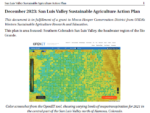
San Luis Valley Sustainable Ag Action Plan
This plan is area focused: Southern Colorado’s San Luis Valley, the headwater region of the RioGrande. Irrigation in this high, arid valley is from a combination of surface water from the Rio Grandeand its tributaries, and pumping from confined and unconfined aquifers. Because these waterresources are overdrafted and connected, managing for sustainability of agriculture involves […]

Switching to Winter Crops Might Help Farmers Cope with Warming World
For people who grow food and cultivate the land, climate change isn’t something experienced though charts, graphs and predictions of foreboding futures. For growers, the threat of a warming world is immediate and increasing. “Climate change is playing out on farms like mine every day, every season and in every extreme weather event,” said Caitlin […]

Reducing Weeds by 80% Using Solarization
La Buena Tierra farmer Maria de los Angeles Carrillo (Angeles) is delighted that her interest in researching a non-chemical pest management practice has reduced her weeds by 80%. Coquillo (nutgrass) was the exception and even that stubborn grass has been reduced greatly and grows weaker roots. Lab tests also demonstrated reduced Verticillium wilt in the […]
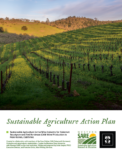
CAB Collective Sustainable Agriculture Action Plan
The Sustainable Agriculture Action Plan for Cabernet Sauvignon and red Bordeaux (CAB) Wine Production in Paso Robles is a document developed by the Paso Robles CAB Collective winegrape growers, winemakers, marketers, proprietors, and other wine industry stakeholders for under a pilot grant program by Western SARE.

Playing Pest Friends
At their annual meeting this summer, Western SARE state coordinators came together and played an educational board game about managing pests. Their experience was similar to other groups who indicate that they learn more by doing than listening. Jason Thomas and Grant Loomis, extension educators at the University of Idaho, received a Western SARE grant […]
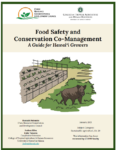
Food Safety and Conservation Co-Management: A Guide for Hawai‘i Growers
A guide for Hawaii farmers interested in improving their efforts towards food safety and improving natural resource conservation, through co-management practices. This document acts as a resource to both learn more about suitable techniques while reviewing pros and cons as shared by local producers, as well as provide template language and guidance towards implementing such […]
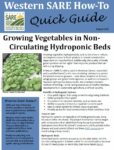
Growing Vegetables in Non-Circulating Hydroponic Beds
Growing vegetables hydroponically, such as bok choy or lettuce, can improve access to fresh produce in remote communities dependent on imported food. Additionally, the quality of locally grown produce can be higher than imported produce that can wilt during shipping. Download PDF
Photosynthesis & Hydroponics Lesson & Demonstration
Mt. Lata Farm in America Samoa created a Teachers' Resource Tool Kit with lesson plans on growing vegetables using hydroponics. This is one sample. For more information, contact the Project Leader .

Agritourism Training Materials
Colorado State University recognized the benefits that agritourism—providing educational and recreational experiences on the farm or ranch to tourists—can provide farmers and rural communities. While agritourism helps to diversify a farmer's income, not every farmer is prepared for a service-oriented industry. With the help of a Western SARE grant, researchers developed a curriculum to help farmers […]
Sustainable Agriculture Farming Systems Project
Public concerns regarding pesticide misuse, food safety, water use and contamination, and depletion of non-renewable resources have motivated the reevaluation of some of the practices of conventional agriculture and the exploration of alternative, more sustainable approaches to growing food. In 1988, the Sustainable Agriculture Farming Systems (SAFS) project was established at the University of California’s […]
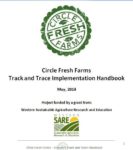
Grower Track and Trace Handbook and Videos
Circle Fresh Farms is a network of small- to medium-sized greenhouses producing certified organic fresh vegetables. In order to remain competitive and compliant with emerging expectations to provide farm-to-consumer product tracking systems, Circle Fresh needed to create a product track and trace system that was compatible with industry standards and also accessible in cost and […]
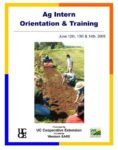
On-Farm Internship Training Binder
The Placer Ag Futures Project was conceived as a response to critical issues affecting local agricultural sustainability. This project was intended to help grow a new crop of agricultural professionals that are trained in sustainable agricultural practices. One part of the Ag Futures Project was the on-farm internship training. The summer internship program consisted of […]
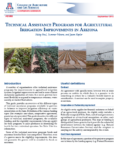
Technical Assistance Programs for Agricultural Irrigation Improvements in Arizona
A number of organizations offer technical assistance programs for improvements to agricultural irrigation systems. Irrigation improvements can lead to more efficient and precise application of water. As a result, growers have more flexibility to respond to temperature extremes, water scarcity or market fluctuations. This guide provides an overview of the different types of technical assistance […]